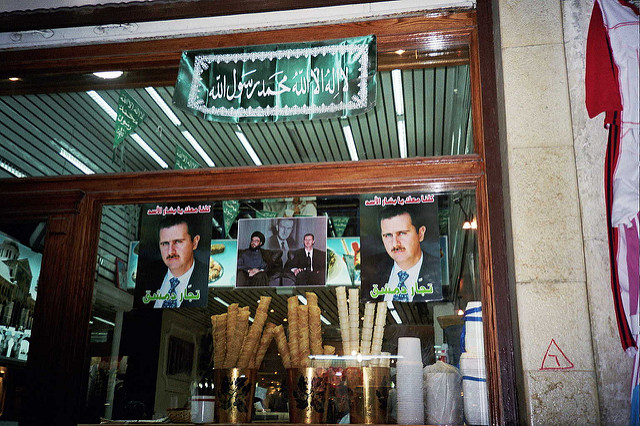Why Syrians Support President Bashar al Assad

It may be surprising to some that the Syrian people still support Pres. Bashar al Assad. The western media has gone to great lengths to portray him as an evil dictator. However, Syrian residents are not affected by western media, and have a different view of their leader.
Syrians see Pres. Assad as a reformer. They have witnessed numerous laws passed for their benefit, and a constant focus on anti-corruption measures. They witnessed the abolition of the one-party rule, and now over 30 political parties are registered. They watched him call for a new constitution to be drafted, and it was ratified in 2012.
Syria has millions of civil servants, and they watched as their salaries were repeatedly and routinely increased by order of the President from 2000 until present. Doctors, professors, teachers, and all the millions of civil servants have personally benefited from Pres. Assad.
During the several years of the worst fighting in Homs, Syria the Syrians watched as Pres. Assad kept the Syrian Army slowly advancing, without unnecessary loss of life. Some critics wanted a quicker military response in Homs, in order to free Homs and allow the residents to return home and rebuild. However, Pres. Assad preferred the slow and steady method of using force and patience combined.
Syria is the only secular country in the Middle East. This was established many decades ago, and when Pres. Assad came to office in summer of 2000 he maintained this form of government. The Syrian people have become very used to the secular nature of Syrian government, and social life. There are 18 different religious sects in Syria. The government and institutions are all secular and protect the rights of all Syrians. In Syria there is no ruling sect, all sects are represented throughout the government, Parliament and military.
Syria has a long history of a policy of resistance to the occupation of Palestine. This has been engrained in the collective thinking of the Syrian population, regardless of religious affiliation, or social status. The suffering of the Palestinian people is always on the minds, and in the hearts of Syrians. Pres. Assad is viewed as a champion of this resistance position. The Syrian people would not take kindly to any softening of this stance. Part of the moral fabric of the Syrian society is the resistance ideology.
Pres. Assad is a well known brand. The long length in office of his father put Pres. Bashar al Assad front and center in the political limelight. Syrians enjoy the safety of continuity, as opposed to radical change which can bring negative changes.
In the June 3, 2014 Presidential election millions of Syrians participated at over 9,600 polling stations across the country. Tens of thousands inundated the Syrian embassy in Lebanon to vote and thousands more came from around the world to vote in Syria because their host countries denied them the right to vote at the local Syrian diplomatic mission. Syrian abroad voted in 36 Syrian Embassies around the world. This was the first competitive election since the new Constitution was approved in 2012. The voting by Syrians living or taking refuge in Lebanon was massive.
Voting in Beirut needed to be extended by a full day. Similarly, the voting inside Syria on June 3, 2014 exceeded expectations and polls remained open until midnight to accommodate the huge numbers of Syrians waiting to vote. Insurgents increased their shelling of civilian areas in Damascus and Aleppo but otherwise the election was conducted peacefully and without attacks on voting stations. There was a large international observers delegation dispersed around the country. The Higher Judicial Committee of the Constitutional Court reported the results:
- 15,840, 575 were eligible to vote, both inside Syria and outside.
- 442,108 ballots were disqualified, for irregularities. (3.8%)
- 11,634,412 voted (73.4%)
- Results of the election were presented by the Speaker of the Parliament:
- Dr. Bashar al Assad received: 10,319,723 votes, 88.7% of the vote.
- Dr. Hassan al Nouri received: 500,272 votes, 4.3% of the vote
- Mr. Maher Hajjar received: 372,301 votes, 3.2% of the vote
Syrians value education. A University degree is the goal of many Syrians, and a source of pride among families. Given the fact that Pres. Assad is the most highly educated President in the world, with a prestigious Medical degree from UK, they are collectively proud of his intelligence. They have also noted his balanced personality. They feel he is neither too soft, nor too hard. They see him as fair and balanced. He has shown them a great deal of patience and perseverance during almost 5 years of international attacks on Syria.
Steven Sahiounie began writing political analysis and commentary during the Syrian war, which began in March 2011. He has published several articles, and has been affiliated with numerous media. He has been interviewed by US, Canadian and German media.


